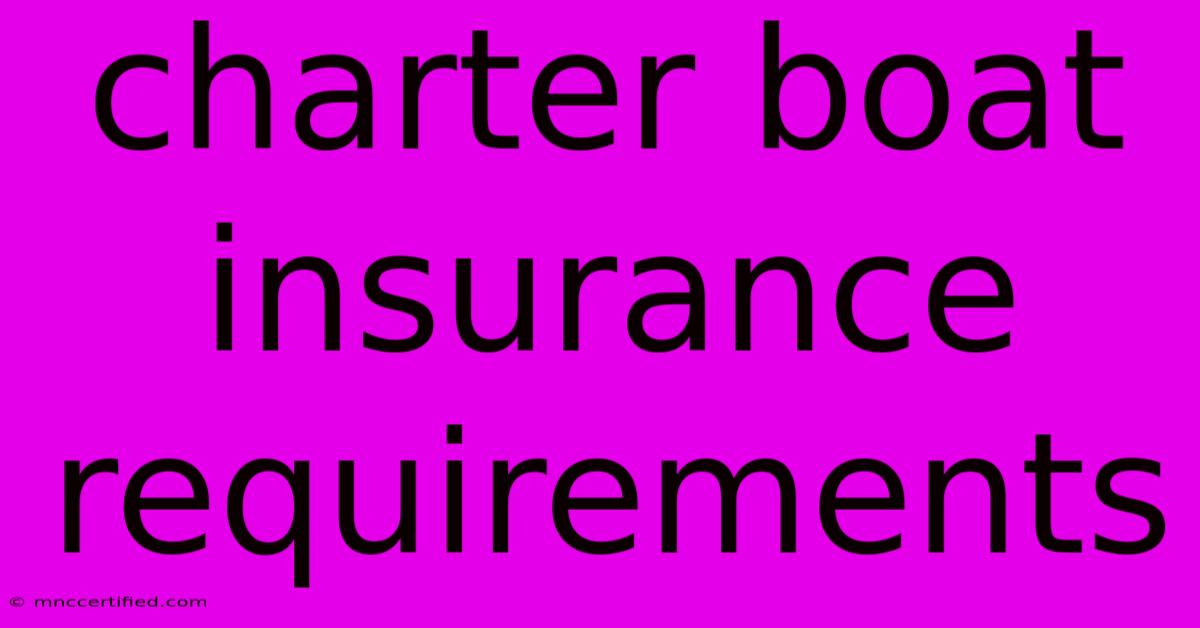Charter Boat Insurance Requirements

Table of Contents
Charter Boat Insurance Requirements: A Comprehensive Guide for Owners and Captains
Operating a charter boat is a rewarding experience, but it comes with significant responsibility. Ensuring you have the right insurance coverage is crucial for protecting yourself, your crew, your passengers, and your vessel. This comprehensive guide will break down the key types of charter boat insurance and the requirements you need to know.
Understanding Charter Boat Insurance: Why It's Essential
Charter boat insurance is a specialized policy designed for vessels operating for hire. It provides financial protection against various risks, including:
- Liability: Covers claims from passengers or third parties for injuries, property damage, or environmental pollution.
- Hull and Machinery: Protects the vessel itself from damage caused by accidents, storms, or other perils.
- Loss of Earnings: Provides compensation if your boat is unable to operate due to damage or other unforeseen events.
- Personal Accident: Covers injuries sustained by the captain and crew while on duty.
Types of Charter Boat Insurance Coverage
1. Marine Liability Insurance:
This is the most fundamental type of insurance for charter boat operators. It covers your legal liability for bodily injury, property damage, and even pollution caused by your vessel. Marine liability policies often include coverage for:
- Passenger Liability: Protects you against claims from passengers due to accidents or negligence.
- Third-Party Liability: Covers claims from other vessels, property, or individuals if your boat causes damage or injury.
- Pollution Liability: Provides coverage for cleanup costs and damages resulting from oil spills or other environmental hazards.
2. Hull and Machinery Insurance:
This policy protects the physical structure of your vessel and its machinery against damage from:
- Accidents: Collisions, grounding, or fire.
- Storms: High winds, heavy seas, and lightning strikes.
- Other Perils: Theft, vandalism, or equipment failure.
3. Loss of Earnings Insurance:
This coverage protects you from financial losses if your charter boat is unable to operate due to damage or other unforeseen events. It covers income you would have earned from bookings during the time the vessel is out of commission.
4. Personal Accident Insurance:
This policy provides coverage for injuries sustained by the captain and crew while on duty. It can cover medical expenses, lost wages, and other related costs.
5. Additional Coverage Options:
Depending on your specific needs and the type of charter operations you conduct, you may consider additional coverage options such as:
- Terrorism Insurance: Protects against losses caused by acts of terrorism.
- Cargo Insurance: Covers damage or loss of passengers' belongings on board the vessel.
- Crew Liability Insurance: Provides coverage for claims against the crew for negligence or misconduct.
Factors Affecting Charter Boat Insurance Costs
Several factors influence the cost of your charter boat insurance:
- Vessel Type and Size: Larger, more complex vessels generally require higher premiums.
- Area of Operation: High-traffic or dangerous waterways can lead to higher premiums.
- Experience and Training: Experienced and well-trained captains may receive lower rates.
- Safety Record: A history of accidents or incidents can increase your premiums.
- Number of Passengers: Carrying a larger number of passengers typically leads to higher premiums.
- Duration of Charter: Longer charter periods often mean higher premiums.
- Coverage Limits: Higher coverage limits generally translate to higher premiums.
Finding the Right Charter Boat Insurance
- Research and Compare: Get quotes from multiple insurance providers to find the best rates and coverage options.
- Consult with a Broker: A marine insurance broker can help you navigate the complexities of charter boat insurance and find the right policy for your needs.
- Understand Your State Requirements: Every state has its own regulations regarding charter boat insurance. Ensure you comply with all applicable laws and regulations.
Maintaining Your Charter Boat Insurance
- Stay Informed: Keep up-to-date on any changes in insurance regulations or industry best practices.
- Report Incidents Promptly: If an accident or incident occurs, report it to your insurance provider immediately.
- Maintain a Good Safety Record: A strong safety record can help you keep your premiums low.
Conclusion
Charter boat insurance is a critical investment for protecting your business and your financial well-being. By understanding the different types of coverage, factors affecting costs, and steps for finding the right policy, you can ensure you have adequate protection and peace of mind while operating your charter boat. Remember, proper insurance is essential for a successful and safe charter business.

Thank you for visiting our website wich cover about Charter Boat Insurance Requirements. We hope the information provided has been useful to you. Feel free to contact us if you have any questions or need further assistance. See you next time and dont miss to bookmark.
Featured Posts
-
Skai Jackson Shares Pregnancy News Disney Stars Journey
Nov 13, 2024
-
Wetherspoons To Remove Beer From Pubs This Week
Nov 13, 2024
-
Prue Leiths Candid Take On Aging
Nov 13, 2024
-
Does Insurance Cover Snow Accidents
Nov 13, 2024
-
Nba Cup Upset Celtics Lose To Hawks
Nov 13, 2024